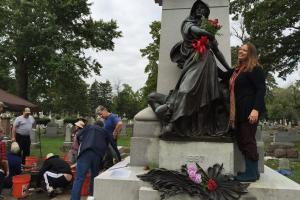Sunday Science: Uncovering an Archaeology of U.S. Empire in Panama
Sapiens
 The Earth’s magnetic field is far from constant. We can track its shifts in rocks that melt and then resolidify. Archaeological finds containing once-burned rocks can be precisely dated using this method. By utilizing the ancient orientation of the Earth’s magnetic field, scientists have been able to piece together the history of military conquests in ancient Judea.
The Earth’s magnetic field is far from constant. We can track its shifts in rocks that melt and then resolidify. Archaeological finds containing once-burned rocks can be precisely dated using this method. By utilizing the ancient orientation of the Earth’s magnetic field, scientists have been able to piece together the history of military conquests in ancient Judea.
 It's been an open secret for almost two years that something important was buried next to the historic Haymarket Martyr's Monument in Forest Park. On Oct. 3, archaeologists and volunteers dug up an object they think may be an 1892 time capsule containing letters, trial documents and other artifacts from Chicago's Haymarket Affair.
It's been an open secret for almost two years that something important was buried next to the historic Haymarket Martyr's Monument in Forest Park. On Oct. 3, archaeologists and volunteers dug up an object they think may be an 1892 time capsule containing letters, trial documents and other artifacts from Chicago's Haymarket Affair.
Spread the word